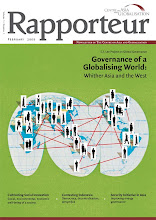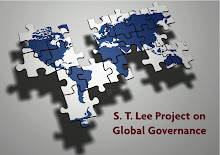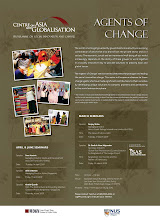 It is human nature to judge people by their appearances. The clothes we wear convey signals about personality, background, taste, and social status. For some, the situation is a little different. This is what the people working at Goonj, an Indian social enterprise, saw in the village of Gidhdha:
It is human nature to judge people by their appearances. The clothes we wear convey signals about personality, background, taste, and social status. For some, the situation is a little different. This is what the people working at Goonj, an Indian social enterprise, saw in the village of Gidhdha:“In the peak of winter days, the children did not have a single piece of cloth covering their bodies - warm clothing was a distant dream. This is a 35-lakh strong community spread across Bihar, where people are forced to eat rats in dire circumstances of poverty & survival. Clothing is the last priority in their lives. Parents often make their naked children sleep in a small hole dug in the ground and cover them with grass (pual), to survive the chilly nights. Women don’t take a bath for many days as they have nothing to change into & often people take loans on heavy interest to buy a single piece of clothing - which lasts them for as long as it does not disintegrate into nothing.”
A typical knee-jerk response to such a situation would be to round up some donations of clothing to give to the villagers in Gidhdha. Clothing donations are not new - and in fact are often abused: spring cleaning of one's closet while easing your conscience - why not? But goods that are passed to those in need in a pitying manner, as hand-outs, or as unwanted trash, end up stripping the recipients of their self esteem and self reliance, ending up as a particularly destructive form of goodwill.
Ashoka Fellow Anshu Gupta (pictured) approaches the poverty challenge with a very different mindset. His organization Goonj is grounded a few simple yet crucial principles: Self help as the starting point. Always uphold and protect a person’s dignity. Seek to empower rather than breed dependency. Goonj takes leftover clothing and turns it into a resource for mobilizing rural communities. The clothes come at the end of a Goonj project, not at the beginning. Goonj organizes village meetings where it asks participants to identify projects that their community would benefit from. Village members are then expected to implement these projects themselves in order to earn the clothing. Clothes (pre-sorted and screened for quality) are given to each villager at the completion of the project - with respect and without making the recipient feel like a charity case. In some cases, the mobilization and impact arising from these projects have created so much positive change that community members have forgotten about the clothing they earned in the process.
There are many different ways to think about social enterprises – e.g. business models for the production of social and environmental goods, or businesses with a triple bottom line - and debates surround the measurements of the output, impact and sustainability of social enterprises. In the case of Goonj, its financial viability has yet to be proven. Since the clothes are donated, the bulk of Goonj's operating costs are in logistics and transportation. Goonj has started some income generation streams through its production of accessories made with recycled material, but revenue from these sales will cover only a fraction of the costs.
However, the social innovation that Goonj has created is so simple and basic, it's lamentable that we even call it an innovation. It is fundamentally about dignity and respect, and 'pricing' the upholding of these principles above other indicators such as numbers of clothing delivered and numbers of households reached. If we were to use the latter numeric measurements, then it would be easy to come up with a more efficient business model. But how does one measure things like empowerment, self-help and dignity, in a social innovation model where the manner in which a piece of clothing is handed over is more important than the speed with which it reaches those in need? How does one grapple with the tradeoffs between empowerment and efficiency in service delivery?
Read more about Goonj’s approach and projects at Goonj homepage. [Yeling]










No comments:
Post a Comment